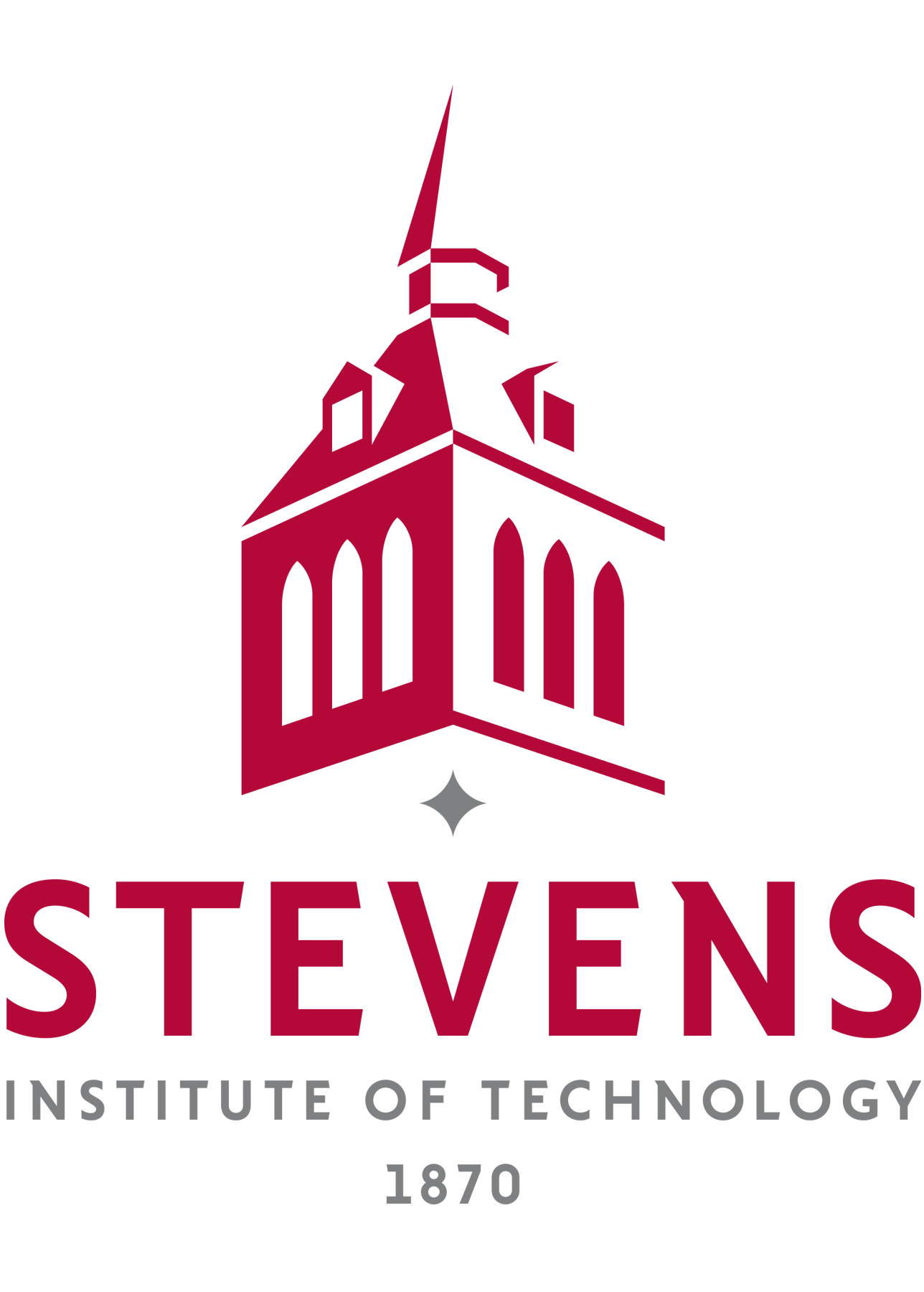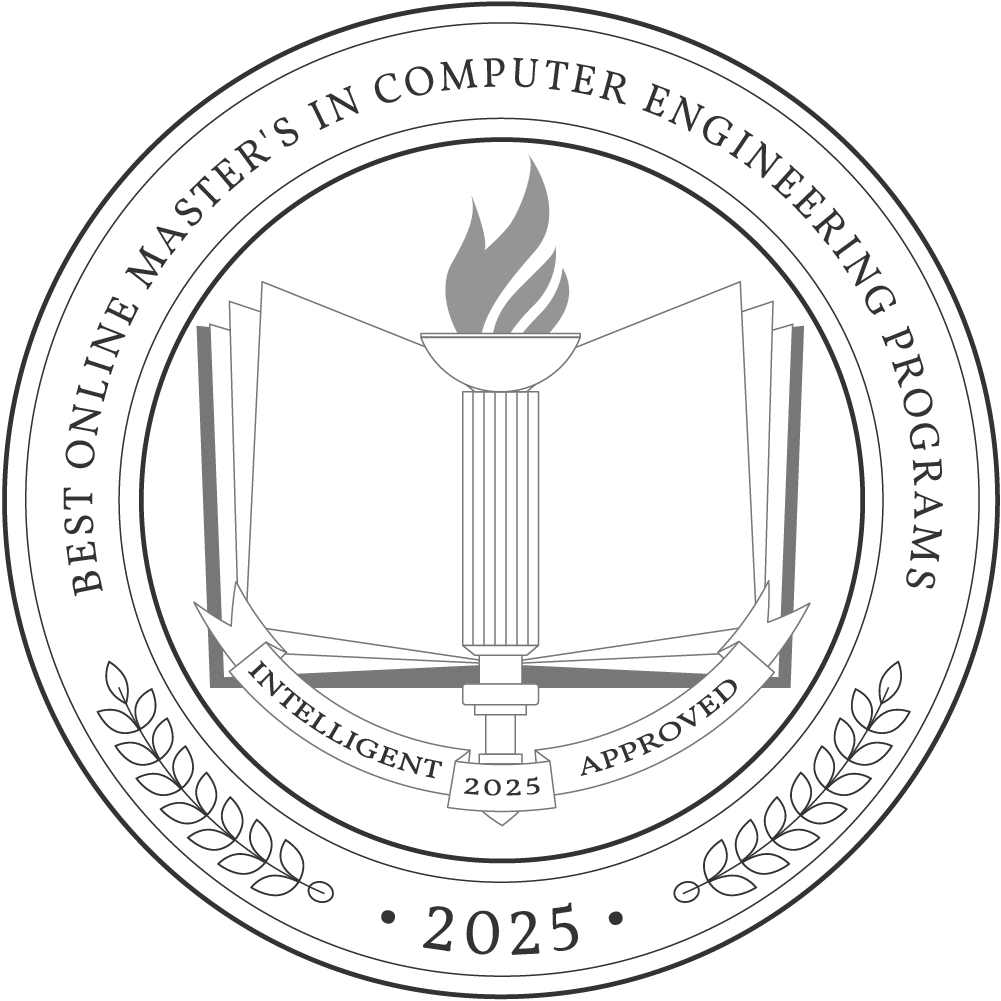An online master’s in computer engineering provides tech-savvy students with a more robust understanding of computer systems. While this degree may not be required to enter most computer-related fields, such a graduate program can help students obtain more advanced positions. For example, graduates would qualify for a job as a computer hardware engineer, and they can expect an average salary of $138,080.
Students can earn their degree in as little as one year in an accelerated program and two years in a standard program. According to the National Center for Education Statistics, the average annual tuition for a graduate degree program is $12,596 at public colleges and $28,017 at private colleges.
Why Trust Us
The Intelligent.com Higher Education Team is dedicated to providing students with independent, equitable school and program rankings and well-researched resources. Our expert-driven articles cover topics related to online colleges and programs, paying for school, and career outlooks. We use data from the U.S. Department of Education’s College Scorecard, the National Center for Education Statistics, and other reputable educational and professional organizations. Our academic advisory team reviews content and verifies accuracy throughout the year for the most current information. Partnerships do not influence rankings or editorial decisions.
- Analyzed over 2,000 national, accredited, and nonprofit colleges and universities
- 800+ rankings pages are reviewed and updated yearly
- Content is informed by reputable sources, surveys, and interviews with academic advisors and other experts
- Over 100 data points are reviewed for accuracy and quality throughout the year, including sources
How we rank schools
Our list features the best online Computer Engineering degree programs at top colleges nationwide. Each school featured is a nonprofit, accredited institution — either public or private — with a high standard of academic quality for post-secondary institutions.
We evaluated each school’s program on tuition costs, admission, retention and graduation rates, faculty, reputation, and the student resources provided for online students. We collected data from trusted sources like the National Center for Education Statistics, individual school and program websites, school admissions counselors, and other data sources. Then, we calculated the Intelligent Score on a scale of 0 to 100 based on the following criterion:
Academic Quality:
- Admission rate versus enrollment rate
- Retention rate of students who return after year one
- Accreditation status (regional and programmatic)
- Nonprofit status, both private and public institutions
Graduation Rate
- Overall graduation rate
- Total number of currently enrolled students, including diversity metrics
- Student-to-faculty ratio
Cost and ROI
- In-state and out-of-state per-credit tuition rates and fees
- Required credits to graduate
- Earning potential after graduation
- Availability of federal student loans, scholarships, and other financial aid options
Student Resources
- Available student services for online-only and hybrid programs
- On-campus amenities like tutoring centers and the number of libraries
Read more about our ranking methodology.
Best 12 Accredited Online Master’s in Computer Engineering Programs
FiltersInstitution Type
Status
- Intelligent Score
- Alphabetically By University Name
- Acceptance Rate
- Enrollment
- In-state Graduate Tuition
- Out-of-state Graduate Tuition
- In-state Undergraduate Tuition
- Out-of-state Undergraduate Tuition

Texas A&M University College of Engineering
Intelligent Score: 99.98In-state: $8,395
Out-of-state: $36,849
In-state: $6,775
Out-of-state: $6,775
SAT: 1160-1380
ACT: 26-32
Resident: $718
Non-Resident: $1,249
Online
Southern Association of Colleges and Schools Commission on Colleges
30

Iowa State University
Intelligent Score: 99.74In-state: $8,042
Out-of-state: $23,230
In-state: $9,758
Out-of-state: $9,758
SAT: 1010-1310
ACT: 21-28
$818
Online, On-Campus
Higher Learning Commission
30

Florida International University
Intelligent Score: 99.06In-state: $4,721
Out-of-state: $16,529
In-state: $8,912
Out-of-state: $8,912
SAT: 1110-1260
ACT: 23-29
$833
Online
Southern Association of Colleges and Schools Commission on Colleges
30

Florida Atlantic University
Intelligent Score: 96.46In-state: $2,522
Out-of-state: $14,374
In-state: $5,467
Out-of-state: $5,467
SAT: 1060-1220
ACT: 21-26
Resident: $372
Non-Resident: $1,027
Online, On-Campus
Southern Association of Colleges and Schools Commission on Colleges
30

Missouri University of Science and Technology
Intelligent Score: 96.40In-state: $9,330
Out-of-state: $28,563
In-state: $10,452
Out-of-state: $10,452
SAT: 1238-1390
ACT: 26-31
$1,200
Online
Higher Learning Commission
30

North Carolina State University
Intelligent Score: 95.90In-state: $6,535
Out-of-state: $26,654
In-state: $9,095
Out-of-state: $9,095
SAT: 1230-1410
ACT: 27-32
Resident: $547
Non-Resident: $1,701
Online
Southern Association of Colleges and Schools Commission on Colleges
30

University of New Mexico
Intelligent Score: 95.39In-state: $6,463
Out-of-state: $22,801
In-state: $5,920
Out-of-state: $5,920
SAT: 1030-1250
ACT: 17-25
$533
Online
Higher Learning Commission
31

University of Michigan - Dearborn
Intelligent Score: 93.45In-state: $16,520
Out-of-state: $53,669
In-state: $24,344
Out-of-state: $24,344
SAT: 1340-1520
ACT: 31-34
Resident: $954
Non-Resident: $1,192
Online, On-Campus, Hybrid
Higher Learning Commission
30

Stevens Institute of Technology
Intelligent Score: 92.70In-state: $53,828
Out-of-state: $53,828
In-state: $37,414
Out-of-state: $37,414
SAT: 1320-1480
ACT: 31-34
$1,930
Online, On-Campus
Middle States Commission on Higher Education
30

Colorado State University
Intelligent Score: 89.88In-state: $9,426
Out-of-state: $28,147
In-state: $10,520
Out-of-state: $10,520
SAT: 1070-1280
ACT: 23-29
$705
Online
Higher Learning Commission
30

Syracuse University
Intelligent Score: 88.41In-state: $53,432
Out-of-state: $53,432
In-state: $40,392
Out-of-state: $40,392
SAT: N/A
ACT: N/A
$1,945
Online
Middle States Commission on Higher Education
30

University of South Carolina
Intelligent Score: 88.12In-state: $12,288
Out-of-state: $33,528
In-state: $13,737
Out-of-state: $13,737
SAT: 1140-1340
ACT: 25-31
Resident: $572
Non-Resident: $1,240
Online
Southern Association of Colleges and Schools Commission on Colleges
30
How to Choose an Online Master’s in Computer Engineering Program
Choose your area of study
This degree may be offered as a Master of Science (MS) or Master of Engineering (MEng). While some online master’s in computer engineering programs are more generalized, others will offer concentrations students can choose from, such as networks, embedded systems, computer science, or software and data engineering. For programs that don’t offer concentrations, it’s still possible to customize your education via the electives that you take.
In some cases, students entering these programs may not know the career they wish to pursue after graduation. If you have a good idea of what you want to do, choosing suitable concentrations and electives can help accelerate your post-graduate career.
Research schools and programs
You should only consider institutions that have been approved by a DOE-recognized regional accrediting organization, such as the New England Commission of Higher Education or Northwest Commission on Colleges and Universities. These organizations evaluate schools to ensure they provide students with a high-quality education. Those who attend a school that isn’t regionally accredited may be unable to access financial aid or transfer credits to another institution if needed.
Ideally, your master’s in computer engineering program will also be accredited by a respected industry group like the Accreditation Board for Engineering and Technology (ABET). This programmatic accrediting organization has particularly high standards for technology education.
It’s also helpful to research your prospective professors to discover what kind of impact they have had on computer engineering. If you do well in your coursework, these professors may be able to help you find the types of jobs you are looking for and help you establish or further your professional network.
To learn more about any schools that you’re interested in, you can visit the school’s website, contact an admissions counselor, follow the school on social media, or attend an in-person or virtual open house.
Prepare for tests and applications
Application requirements vary by school and program. While not a universal requirement, it is common for schools offering an online master’s in computer engineering program to require applicants to submit GRE scores. In many cases, a successful applicant must score 146 or higher in verbal reasoning and 155 or higher in quantitative analysis. If you haven’t taken the GRE, it may take up to three months to study for and up to 15 days to receive your test scores. Be sure to consider this when considering the application deadlines of programs you are interested in.
You will likely need to submit undergraduate transcripts, and letters of recommendation and a personal statement may be required as well. Always contact an admissions counselor to ensure you have the most accurate information regarding requirements and deadlines.
Select your program
Students who discover more than one online master’s in computer engineering program they are interested in will need to apply additional criteria to select the program uniquely suited to their specific needs.
For most students, the primary criterion is budget. It’s essential to apply to schools that are affordable enough that graduates don’t have extensive student debt. In addition to the overall program cost, some schools may be cheaper than others because they offer scholarships, grants, or assistantships that others do not. And if you’re worried about the prospect of online learning, you may decide on a program that offers remote tutoring opportunities and an extended online support system for distance learners.
Before making your final decision, review your needs and goals again. Do you plan to attend school full-time or part-time? Are you only interested in 100% online programs, or are you fine with a hybrid program that has a few in-person requirements? Some programs offer asynchronous courses, which can be completed at your own pace, while others only offer synchronous courses, which involve remotely attending lectures and completing assignments at the same time as other students — which of these two online learning formats do you prefer? Your school should accommodate your scheduling needs and learning preferences.
Determine how you’ll pay for your degree
Even if you can pay for your program, filling out the Free Application for Federal Student Aid (FAFSA) each year is advisable. Doing so helps graduate students qualify for assistance that can pay for textbooks, tuition, and your cost of living as a student. Completing this form may also help you to qualify for certain kinds of grants and scholarships, especially if that aid has any income requirement. Because the FAFSA is quick and easy to fill out, it’s good to fill it out each academic year to maximize your chances of getting as much aid as possible.
Also, those who already work in the field should see if their employer offers tuition assistance benefits. And be sure to speak to financial aid counselors at the schools you’re interested in for the most accurate and specific information about program cost.
What Can You Expect from an Online Master’s in Computer Engineering Program?
An online master’s in computer engineering program teaches students advanced IT and computer engineering concepts. Coursework is structured with the assumption that students wish to work as upper-level computer engineers, so much of the curriculum will focus on taking your existing knowledge of this specialized field and obtaining a more advanced position within the industry.
If you choose a concentration, many of your courses will reflect that. For example, someone specializing in software and data engineering will take fewer networking courses than someone specializing in networking (and vice versa).
However, whether you specialize or enroll in a more general program, all of the coursework provides enough of a core foundation to achieve success as a computer engineer. Students may be able to earn this degree in as little as one year via accelerated programs, and the fact that there are usually no in-person requirements helps students progress through these programs quickly.
Potential courses you’ll take in an online master’s in computer engineering program
- Hardware Security. This class helps students learn more about hardware security concerning ASIC and FPGA technologies. As such, students will learn more about the supply chain as it relates to hardware and the various threats to hardware security that may come from counterfeiting, IP piracy, reverse engineering, and more.
- Internet of Things. This course introduces students to the technology and principles underlying this phenomenon and the challenges facing those trying to develop solutions to inevitable consumer dilemmas. The course covers a wide range of topics related to the Internet of Things, from digital sensing to cryptography.
- Learning From Data. Thanks to the advent of ChatGPT and other AI technology, topics such as machine learning and data science have become more relevant than ever before. This course helps students learn more about machine learning and pattern recognition. From abstract theories to practical mathematics and heuristics, this course prepares students to take advantage of our increasingly data-driven society.
- Advanced Computer Architecture. This course focuses on analyzing computer architecture using qualitative and quantitative methods. Students will learn about the memories, processors, and networks that are part of every computer and how the intersection of these three concepts has led to many modern technological advances.
What Can You Do With an Online Master’s in Computer Engineering Degree?
Career outlook
Computer engineers are not limited to one industry. Their expertise is sought after in various sectors, including aerospace, healthcare, and telecommunications. As technology becomes increasingly integrated into these fields, the skills of computer engineers will be in high demand. In addition, computer engineering is a global field, providing opportunities for professionals to work on international projects and collaborate with teams worldwide.
Graduates with an online master’s degree in computer engineering have a wide array of career paths to explore, each offering opportunities to make significant contributions to technology and innovation. Here are some common career paths for individuals with a master’s in computer engineering:
- Computer hardware engineer — Research, design, and test computer equipment.
- Median annual salary: $138,080
- Projected employment growth (through 2032): 5%
- New job openings projected: 4,600 annually
- Information systems manager — Assess an organization’s technology needs, plan IT projects, and hire and supervise IT staff.
- Median annual salary: $169,510
- Projected employment growth (through 2032): 15%
- New job openings projected: 46,900 annually
- Database administrator or architect — Design databases, ensure databases are secure and operating efficiently, and keep user permissions up to date.
- Median annual salary: $117,450
- Projected employment growth (through 2032): 8%
- New job openings projected: 10,200 annually
Online Master’s in Computer Engineering Degree Frequently Asked Questions
How do I apply to an online master’s in computer engineering degree program?
To apply to an online master’s in computer engineering program, simply navigate to the website of the school(s) you are interested in and follow the application instructions. These instructions should specify what you need to submit with the application. Typical requirements include undergraduate transcripts, GRE test scores, and letters of recommendation. Some schools may require more paperwork, and some may need less, so review all application requirements carefully.
Contact the school’s admissions counselor if you have any questions or concerns. The counselor can verify the exact application requirements and answer any lingering questions you may still have.
How much does an online master’s in computer engineering degree cost?
The National Center for Education Statistics reports that the average annual tuition for graduate school is $20,513, though exactly how much your program will cost depends on multiple factors. For example, public universities will almost always have cheaper tuition than private universities, and the number of credit hours you need will influence the cost.
How long does it take to earn an online master’s in computer engineering degree?
Most online master’s in computer engineering programs are designed to be completed in two years by students who are attending full-time. If you get accepted into an accelerated program or have transferable credits (such as credits from a master’s in computer science degree), you may be able to complete all the required coursework in as little as one year. If you can’t attend school full-time, that’s OK: most programs are flexible enough for online students to progress at their own pace until they complete all the coursework.
Is an online master’s degree in computer engineering worth it?
Earning an online master’s degree in computer engineering is worthwhile for individuals seeking to advance their careers in technology and engineering. This degree equips graduates with the knowledge, skills, and credentials needed for leadership roles in the field.
Online programs can be an excellent choice for those who need the flexibility to attend to other personal or professional commitments. Adult learners already working in the field may especially benefit from programs with asynchronous courses. For those dedicated to making a significant impact in computer engineering, an online master’s degree provides a convenient and effective pathway to achieve your career goals in a cost-effective and efficient manner.

